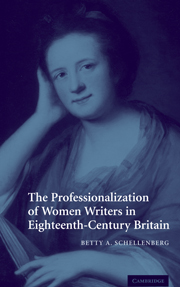Book contents
- Frontmatter
- Contents
- Acknowledgments
- A note on citations
- Introduction: “building on public approbation”
- 1 Frances Sheridan, John Home, and public virtue
- 2 The politicized pastoral of Frances Brooke
- 3 Sarah Scott, historian, in the republic of letters
- 4 The (female) literary careers of Sarah Fielding and Charlotte Lennox
- 5 Harmless mediocrity: Edward Kimber and the Minifie sisters
- 6 From propensity to profession in the early career of Frances Burney
- 7 Women writers and “the Great Forgetting”
- Coda
- Notes
- Bibliography
- Index
6 - From propensity to profession in the early career of Frances Burney
Published online by Cambridge University Press: 12 November 2009
- Frontmatter
- Contents
- Acknowledgments
- A note on citations
- Introduction: “building on public approbation”
- 1 Frances Sheridan, John Home, and public virtue
- 2 The politicized pastoral of Frances Brooke
- 3 Sarah Scott, historian, in the republic of letters
- 4 The (female) literary careers of Sarah Fielding and Charlotte Lennox
- 5 Harmless mediocrity: Edward Kimber and the Minifie sisters
- 6 From propensity to profession in the early career of Frances Burney
- 7 Women writers and “the Great Forgetting”
- Coda
- Notes
- Bibliography
- Index
Summary
So early was I impressed myself with ideas that fastened degradation to this class of composition [the novel], that at the age of adolescence, I struggled against the propensity which, even in childhood, even from the moment I could hold a pen, had impelled me into its toils.
(Frances Burney, The Wanderer, 1814)my dear Fanny, for God's sake dont talk of hard Fagging! It was not hard Fagging, that produced such a Work as Evelina! – – – it was the Ebullition of true Sterling Genius! you wrote it, because you could not help it! – it came, & so you put it down on Paper! – leave Fagging, & Labour, to him
– – – – – – – – who high in Drury Lane,
Lull'd by soft Zephyrs thro the broken pane,
Rhymes ere he wakes, & prints before Term Ends,
Compell'd by Hunger & request of Friends.
Tis not sitting down to a Desk with Pen, Ink & Paper, that will command Inspiration.
(Samuel Crisp to Frances Burney, 1779)There are two reasons why a treatment of Frances Burney may appear out of place in this study. First, she launched into print in 1778, a decade after the deaths of Sarah Fielding and Frances Sheridan, after Charlotte Lennox and Sarah Scott had produced most or all of their published work, and when only Frances Brooke continued in the public eye as a respected, if sometimes controversial, literary professional.
- Type
- Chapter
- Information
- Publisher: Cambridge University PressPrint publication year: 2005



